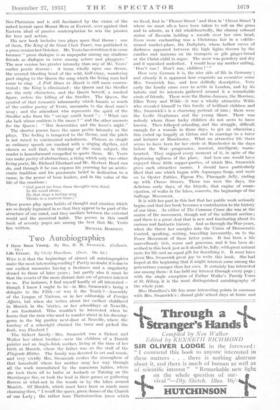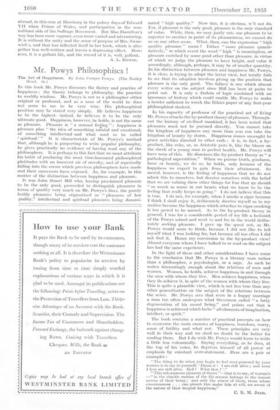Two Autobiographies
Have Been Young. By Mrs. H. M. Swanwick. (Gollanez. 18s.) Life Errant. By Cicely Hamilton. (Dent. 10s. 6d.) Wily is it that the beginnings of almost all autobiographies make the most interesting reading? Partly no doubt it is due to our earliest memories having a freslmess and a singularity denied to those of later years ; but partly also it must be that the events of the more distant (late are of greater interest to us. For instance, I find myself hardly at all interested— though I know I ought to be—in Mrs. Swanwick's being a delegate to the Fifth—or was it the Tenth ?—Assembly of the League of Nations, or in her editorship of Foreign Affairs, but when she writes about her earliest childhood in Munich in the 'sixties, or her schooldays at Neuville, I am fascinated. Who wouldn't be interested when he learns that the man who used to wander about in his dressing, gown in the big garden next-door at Neuvillc, where the tomboy of a schoolgirl climbed the trees and picked the fruit, was Flaubert ?
The Sicked family—Mrs. Swanwick was a Sickert and Walter her eldest brother—were the children of a Danish painter and an Anglo-Irish mother, living at the time of her birth at Munich, where the father was on the staff of the Fliegende Blatter. The family was devoted to art and music, and very vividly Mrs. Swanwick evokes the atmosphere of that household where her mother sang her way through all the work necessitated by the numerous babies, where she took them all to bathe at Ambach or Tutzing on the Starnberger See, or took the lead in their games or gathering flowers or what-not in the woods or by the lakes around Munich. Of Munich, which must have been so much more charming then, " I recall the queer, green domes of the Church of our Lady ; the rather bare Theresienwiese (near which we lived, first in 'Flower Street' and then in Clover Street ') where we must oft( n have been taken to roll on the 'grass and to admire, as I did wholeheartedly, the clumsy colossal statue of Bavaria holding a wreath over her own head: Even more enchanting was a Christmas fair in a obble- stoned market-place, the Dultplatz, where hollow eaves of darkness appeared between the high lights thrown by the candles and lanterns on tin trumpets or gilt ginger-bread or the Christ-child in sugar. The snow was powdery and dry and it squeaked underfoot. I would hear my mother calling, 'Don't run ! Don't run, children 1' " How very German it is, the nice side of life in Germany ; and already it is apparent how exquisite an evocative sense Mrs. Swanwick has, and how skilfully descriptive. Very early the family came over to settle in London, and by its talents and its interests gathered around it a remarkable circle of friends. There were the Bume-Joneses, the Morrises; Ellen Terry and Wilde—it was a wholly attractive Wilde who revealed himself to this family of brilliant children and Mrs. Swanwiek's is a charming portrait of him ; there were the Leslie Stephenses and the young Shaw. There was nobody whom those lucky children do not seem to have known. Then follolzed schooling, and the struggle, difficult enough for a woman in those days, to get an education ; this ended up happily at Girton and in marriage to a tutor and lecturer at Manchester. What an attractive' life there seems to have been for her circle at Manchester in the days before the War—progressive, musical, intelligent,- warm- hearted. They enjoyed every moment of it, in spite of the depressing ugliness of the place. And how one . would have enjoyed those little supper-parties, of which Mrs: Swanwick gives such attractive menus. I should have •particularly liked that one which began with Asparagus Soup, and went on to Oyster Patties, Pigeon Pie, Pineapple Jelly, ending up with Cheese Straws. Those too were the ' days, the delicious early days, of the bicycle, that engine of email- cipation, of walks in the lakes, concerts, the beginnings 'of the Suffrage Movement.
It is with her part in this last that her public work seriously begins and that her book becomes a contribution to the history of our time. As editor of The Common Cause she' was at the centre of the movement, though not of the militant sectioir ; and there is a great deal that is new and fascinating about its curious and fantastic history. And so through the War-years, when she threw her energies into the Union of Democratic Control, speaking, writing, travelling incessantly, on to the Peace Movement of these latter years. It has been a life marvellously rich, warm and generous, and it has been de- scribed in this book just as it should be, fully, with great natural • taste for life and an equal gift for describing it. It must have given Mrs. Swanwick great joy to write this book. She had hoped at the beginning that it might interest some among the generations younger than her own. It certainly has interested one among them : it has held my interest through every page ; with the single exception of Father Walke's Twenty Years at St. Hilary, it is the most distinguished autobiography of the whole year.
Miss Hamilton's life has some interesting points in common with Mrs. Swamirick's : dismal girls'-school days at home and abroad, in this case at Homburg in the palmy days of Edward VII when Prince of Wales, and participation in the nona militant side of the Suffrage Movement. But Miss Hamilt on's way has been more vagrant, even more varied and adventuring. It is without the unity and the sense of purpose of Mrs. Swan- wick's, and that has reflected itself in her book, which is alto- gether less well-written and leaves a depressing effect. How- ever, it is a gallant life, and the record of it is, well, gallant.
A. L. ROWSE.



































 Previous page
Previous page